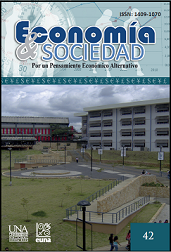Capacidades tecnológicas para la innovación en la industria del software: un caso de éxito.
Palavras-chave:
Capacidades tecnológicas, innovación, pymes, softwareResumo
En este artículo se estudia la formación y acumulación de capacidades tecnológicas para el caso empírico de una empresa costarricense de software líder en el mercado. Asimismo, se analiza la acumulación de capacidades tecnológicas a través de los diferentes mecanismos existentes de transferencia de conocimiento y actividades de aprendizaje; así como dónde están centradas las capacidades tecnológicas en la empresa. Para alcanzar a comprender los diferentes niveles de innovación de la empresa, se construyó una matriz de capacidades tecnológicas, según la propuesta de Bell y Pavitt (1995). Se encontró que la empresa Alpha superó las capacidades tecnológicas operativas básicas y excedió las capacidades innovadoras, logrando alcanzar niveles avanzados en la mayoría de las actividades, especialmente en sus actividades principales.
Referências
Bell, M. y Pavitt, K. (1995). The Development of Technological Capabilities. En Haque, I. (Ed.).
Trade, Technology and International Competitiveness (pp. 69-101). The World Bank, Washington
Bitzer, J. (1997). The computer software industry in East and West: do eastern european countries need a specific science and technology policy? Deutches Institut for Whirtschaftsforshung, Discussion Paper N.° 149. Berlin.
Carvajal, A. (2010). Las capacidades tecnológicas como base para el desarrollo. Actualidades Investigativas en Educación. 10(1), 1-19. Recuperado de http://revista.inie.ucr.ac.cr/uploads/tx_magazine/base.pdf
Fergusson, P. y Fergusson, G. (1994). Industrial Economics, Chapter 6: Invention, Innovation and Diffusion. New York: University Press.
Lall, S. (1992). Technological Capabilities and Industrialization. World Development (20), 2, 165-186.
Monge-González, R., Vicente-León, A. y Alfaro-Chamberlain, J. (2005). I&D, innovación y transferencia de tecnología en el sector productivo costarricense más orientado hacia la economía basada en el conocimiento. CONICIT y CAATEC, Costa Rica.
MICIT. Indicadores nacionales (2009). Ciencia, tecnología e innovación. Convenio Universidad Nacional, CINPE. Costa Rica.
Pavitt, K. (1984). Sectoral Patterns of Technical Change: Towards a Taxonomy and a Theory. Research policy 13, 343-73
Rousseva, R. (2006). Technological capabilities with different degree of coherence: a comparative study of domestic-oriented vs export-driven Bulgarian Software Companies. United Nations University-Maastricht Economic and Social Research and Training Centre on Innovation and Technology. Netherlands. Working paper series #2006-004.
Rousseva, R. (2007). Approach for analyzing Technological Capabilities in Latecomer Software Companies. United Nations University-Maastricht Economic and Social Research and Training Centre on Innovation and Technology. Netherlands. Working paper series #2007-035.
Subirá, A. y Gurguí, A. (2007). Políticas para la competitividad: una experiencia de gobierno. España: Antoni Bosch Editor.
Szogs, A. (2010). Technology transfer and technological capability building in informal firms in Tanzania. Lund University.
Van Dijk, M. y Sandee, H. (2002). Innovation and Small enterprises in the Third World. Estados Unidos: Editorial Edward Elgar.
Downloads
Publicado
Como Citar
Edição
Seção
Licença
This publication is subject to the Creative Commons License; therefore, its attributions and restrictions must be respected.
Authors publishing in this Journal accept the following conditions:
- Authors retain copyright ownership and give the Journal first publication right of the paper, which is registered with the Creative Commons Attribution-NonCommercial-ShareAlike 4.0 International License. This license allows third parties to use the published work provided it is sourced as firstly published in this Journal.
- Authors may enter into other independent and additional contractual agreements for the non-exclusive distribution of the article published in this Journal (e.g., to be included in an institutional repository or published in a book) provided it is clearly stated that the work was published in this Journal for the first time.
- Authors are allowed and recommended to publish their work on the Internet (for example, on institutional or personal pages) before and during the review and publication process, as it can lead to productive exchanges and a greater and faster dissemination of work published.

The Economía & Sociedad Journal, published by Universidad Nacional, is licensed under a Creative Commons Reconocimiento-NoComercial-CompartirIgual 4.0 Internacional License. Based on http://www.revistas.una.ac.cr/index.php/economia.








